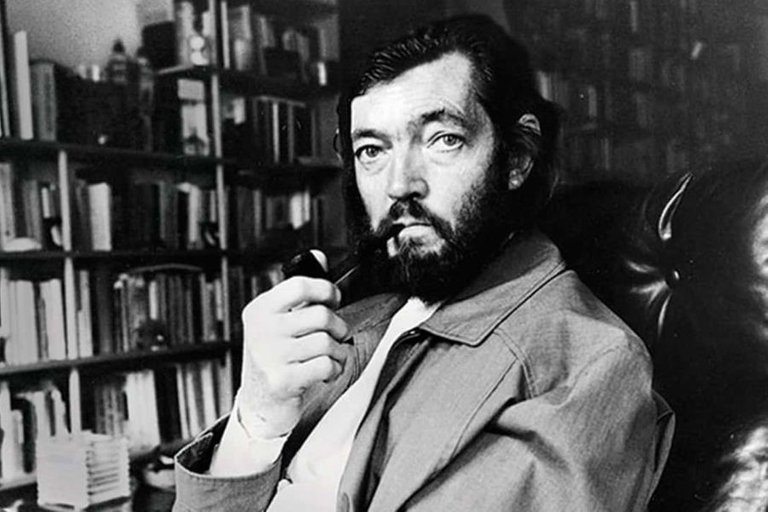

En este cuento Cortázar hecho a mano de tan solo una idea y una prosa calculada, como siempre, encontrando en pocos segundos, la sentencia definitiva que consagra al escritor, su mensaje claro y definitivo.

In this story Cortázar crafted from a single idea and a calculated prose, as always, finding in a few seconds, the definitive sentence that consecrates the writer, his clear and definitive message.


“A man drops his glasses on the floor, which make a terrible noise when they hit the tiles. The man crouches down in a very cold state because eyeglass lenses cost a lot of money, but he discovers with astonishment that by a miracle they have not broken. Now this gentleman feels deeply grateful, and realizes that what happened is worth a friendly warning, so he goes to an optician's shop and immediately buys a leather case with double protection padding, in order to cure himself. An hour later, he drops the case, and when he bends down without further concern, he discovers that the glasses have crumbled to dust. It takes this gentleman a while to understand that the designs of Providence are inscrutable, and that in reality the miracle has happened now.”
Source from which the story was extracted.

Comentarios
La religiosidad forma parte principal del mensaje. La prosa es el vehículo para llevar esta hermosa reflexión. El personaje cumple con toda la carga asignada por el autor. El menudo contenido no versa en mala reputación.
Critica positiva
Pinta con letras y prosa un mensaje clarísimo.
Crítica negativa
Terminas leyendo el cuento y deseando por más prosa.
Mensaje
Como dice el dicho popular: “lo que es para el cura, se va para la iglesia” Sus lentes se iban a partir de todas formas. Pero las cosas nunca son lo que son, tal vez el pobre anciano necesitaba nueva fórmula, necesitaba llegar tarde a otro lugar, necesitaba conocer la señora de la óptica, recibió algunas palabras condescendientes que necesitaba de camino a la óptica.
A veces luchamos contra situaciones en la vida que son para nosotros, y por muy ironicas que sean las situaciones no dejamos de verlas como lo que son, este hombre del cuento sólo ve que sus lentes se rompieron al instante en que compró un forro nuevo, ¿necesitaba tener esa primera advertencia para proteger sus lentes? "Solo sabes que la quieres cuando la dejas marchar" Dice la canción de Passenger, Let Her go. Sólo cuidamos las cosas cuando supimos que la íbamos a perder ¿es así como queremos vivir?
Comments
Religiosity forms a major part of the message. The prose is the vehicle to carry this beautiful reflection. The character fulfills all the burden assigned by the author. The small content is not often disreputable.
Positive criticism
It paints with letters and prose a very clear message.
Negative review
You end up reading the story and wishing for more prose.
Message
As the popular saying goes: "what goes to the priest, goes to the church" His glasses were going to break anyway. But things are never what they are, maybe the poor old man needed new formula, needed to be late to another place, needed to meet the lady at the optician's, got some condescending words he needed on the way to the optician.
Sometimes we struggle with situations in life that are for us, and as ironic as the situations are we don't fail to see them for what they are, this man in the story only sees that his glasses broke the instant he bought a new liner, did he need to have that first warning to protect his glasses? "You only know you love her when you let her go " says the Passenger song, Let Her go. We only took care of things when we knew we were going to lose her, is that how we want to live?


Sobre el autor | About the author
Julio Cortázar nació el 26 de agosto 1914 en Bélgica, murió el 12 de febrero de 1984 en Paris, pero su corazón siempre quedó sembrado en Argentina. Considerado uno de los autores más innovadores y originales de su tiempo, fue maestro del cuento, la prosa poética y la narración breve en general. Fue también creador de importantes novelas, las cuales inauguraron una nueva forma de hacer literatura en el mundo hispano, pues rompieron los moldes clásicos mediante narraciones que escapan de la linealidad temporal. Fuente.
Julio Cortázar was born on August 26, 1914 in Belgium, he died on February 12, 1984 in Paris, but his heart always remained planted in Argentina. Considered one of the most innovative and original authors of his time, he was a master of short stories, poetic prose and short stories in general. He was also the creator of important novels, which inaugurated a new form of literature in the Hispanic world, as they broke the classic molds through narratives that escaped from the linearity of time.Source.

Imagen de portada editada en Canva.com
Recurso de portada
